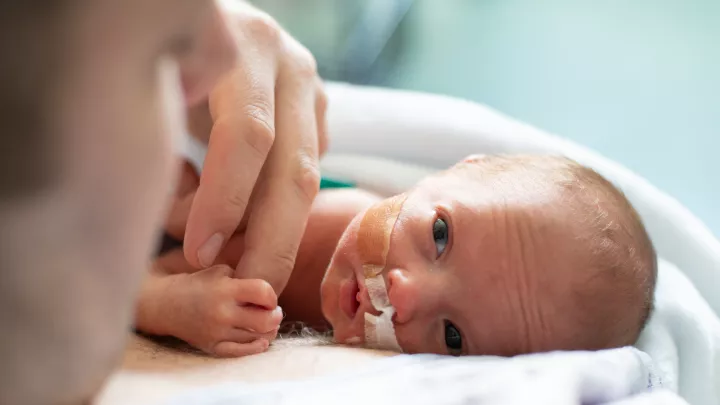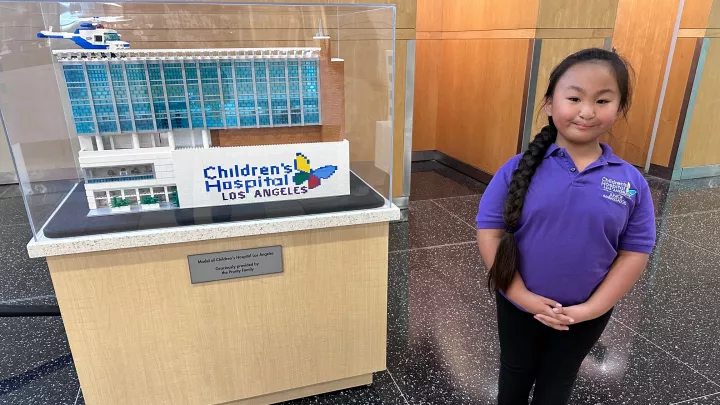Prenatal Genetic Testing and Genetic Counseling
Prenatal genetic tests give parents-to-be information about risk factors for genetic disorders. You may choose to have genetic testing if you have a family history of specific genetic conditions or if routine prenatal screenings show the possibility of a genetic condition.
The specialists in the Fetal and Neonatal Institute at Children’s Hospital Los Angeles work closely with the Center for Personalized Medicine to provide genetic testing and counseling. Our on-site genomic testing lab provides quick, accurate diagnoses for genetic conditions. You get fast answers that lead to quicker treatment and better outcomes.
Types of Prenatal Genetic Screening
There are two categories of prenatal genetic screening:
- Carrier screening: Parents-to-be receive these tests before getting pregnant. Carrier screening uses a blood sample or cheek swab to see if a person has genes that could lead to genetic disorders.
- Genetic screening: Women who are pregnant can receive genetic testing via a combination of ultrasound (imaging test that uses sound waves), blood tests and tissue samples. These tests evaluate a fetus for genetic disorders.
What to Expect During Genetic Testing
If you decide you want genetic testing, your provider can provide a referral. If routine screenings detect a possible genetic disorder, your provider may send you to the Fetal-Maternal Center for further diagnosis.
Women can get prenatal tests three different ways:
- First-trimester screening: First-trimester tests include blood tests and ultrasound exams. These tests screen the fetus for abdominal wall defects, heart conditions or problems with the skeletal system. During the ultrasound, your health care provider also measures the size of the fold in the back of the baby’s neck (nuchal fold). Depending on this measurement, we may order further tests to confirm or rule out genetic conditions like Down syndrome.
- Second-trimester screening: At this stage, health care providers offer blood tests called quad screens. Quad screens measure four different substances in your blood. This test can detect the possibility of both Down syndrome and neural tube defects (problems with the brain or spinal cord). Women may need additional tests to confirm or rule out these conditions.
- Combined first- and second-trimester screening: With these tests, we take a blood sample from the pregnant woman, usually from the arm. With this sample, we can detect and assess the fetus’s DNA in our genetic testing lab. This blood test can tell us if your baby has an increased risk of specific chromosome problems such as Down syndrome or spina bifida (a condition that causes problems with the brain or spine).
Types of genetic disorders we screen for
Prenatal genetic testing can detect a variety of genetic conditions, including:
- Autism spectrum disorders
- Charcot-Marie-Tooth disease
- Cystic fibrosis
- Down syndrome
- Duchenne muscular dystrophy
- Fragile X syndrome
- Huntington’s disease
- Neurofibromatosis
- Sickle cell disease
- Spina bifida
- Tay-Sachs disease
- Turner syndrome
Genetic Counseling Services
Patients in the Fetal-Maternal Center (FMC) may participate in genetic screening and genetic counseling.
If your baby has a genetic disorder or if testing results raise concerns, a genetic counselor can answer questions, offer support, and help you get any other care and support you need.
Research in Genetics and Personalized Medicine
The research team in the Fetal and Neonatal Institute has led new, innovative studies in evaluating placentas. Looking at placental tissue helps specialists learn more about making more efficient genetic diagnoses. This research also involves searching for more causes of growth and development problems in babies.
Specialists at Children’s Hospital Los Angeles lead and conduct a variety of clinical trials. Our participation in research gives our patients opportunities to receive the most innovative new therapies. Whether or not your baby is a candidate for a clinical trial, you both receive care from research-driven experts who are leaders in their field.


